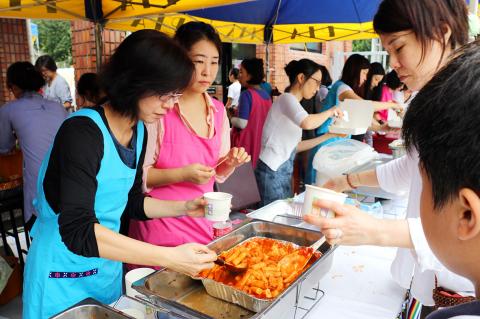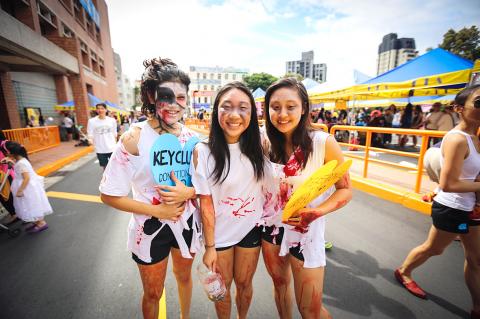If there’s one thing that the doting parents of Taipei American School (TAS) care fervently about (besides their children’s SAT scores), it’s nourishing young minds. The international food fair organized by the Parent Teacher Association (PTA) is an event that draws thousands of foodies from the expat community of suburban Tianmu and beyond every year. The fair returns tomorrow for its 33rd year.
From Vietnam to Venezuela, more than 20 countries are represented and around 8,000 visitors are expected to show up. In addition to sushi, samosas and shaved ice — all prepared by the gracious parents — there will also be arts and crafts stations, a bouncy castle, as well as a haunted house full of goblins and ghosts orchestrated entirely by the high school students.
Speaking on behalf of the PTA, Priya Purswaney says: “The parents put in a lot of hard work months before the event to ensure that it goes smoothly.”

Photo courtesy of TAS
Purswaney adds that in recent years, the fair has drawn more volunteers from outside of the TAS community, and that local schools in Taipei even arrange field trips to visit the fair. More student associations and clubs at TAS have also been involved in planning the activities for this year’s fair, so expect to see new booths in addition to the usual face painting, water balloon toss and stands selling fake tattoos.
“The fair has become more international and features double the number of clubs, so that means double the fun,” Purswaney says.
Though it’s expected that when you bring a bunch of parents together, there’s bound to be some squabbles.

Photo courtesy of TAS
Nevertheless, the PTA says the preparation is mostly a concerted effort, and that what’s more important is that the parents have the students’ well-being at heart.
“The only thing the TAS parents get out of it is the satisfaction of doing something for the school,” Purswaney says.
If there’s one thing they can agree upon though, it’s promoting healthy eating (never mind the cotton candy stand that seems to have the longest line every year). The school’s cafeteria does indeed have an amazing assortment of gourmet dishes that would put many seasoned restaurateurs to shame. As for the fair, the food is mostly home-cooked or sponsored by top restaurants around Taipei.
“It’s definitely important to teach children at an early age the importance of a healthy diet.” Purswaney says. “The TAS cafeteria is a no fry zone, and vendors at the fair are also encouraged to reduce the amount of fried goods.”
The food fair starts tomorrow at 10am and is open to the public. A portion of the proceeds will go to developing the school, while the rest of the funds is allocated to different charities each year.

Taiwan has next to no political engagement in Myanmar, either with the ruling military junta nor the dozens of armed groups who’ve in the last five years taken over around two-thirds of the nation’s territory in a sprawling, patchwork civil war. But early last month, the leader of one relatively minor Burmese revolutionary faction, General Nerdah Bomya, who is also an alleged war criminal, made a low key visit to Taipei, where he met with a member of President William Lai’s (賴清德) staff, a retired Taiwanese military official and several academics. “I feel like Taiwan is a good example of

March 2 to March 8 Gunfire rang out along the shore of the frontline island of Lieyu (烈嶼) on a foggy afternoon on March 7, 1987. By the time it was over, about 20 unarmed Vietnamese refugees — men, women, elderly and children — were dead. They were hastily buried, followed by decades of silence. Months later, opposition politicians and journalists tried to uncover what had happened, but conflicting accounts only deepened the confusion. One version suggested that government troops had mistakenly killed their own operatives attempting to return home from Vietnam. The military maintained that the

Jacques Poissant’s suffering stopped the day he asked his daughter if it would be “cowardly to ask to be helped to die.” The retired Canadian insurance adviser was 93, and “was wasting away” after a long battle with prostate cancer. “He no longer had any zest for life,” Josee Poissant said. Last year her mother made the same choice at 96 when she realized she would not be getting out of hospital. She died surrounded by her children and their partners listening to the music she loved. “She was at peace. She sang until she went to sleep.” Josee Poissant remembers it as a beautiful

Before the last section of the round-the-island railway was electrified, one old blue train still chugged back and forth between Pingtung County’s Fangliao (枋寮) and Taitung (台東) stations once a day. It was so slow, was so hot (it had no air conditioning) and covered such a short distance, that the low fare still failed to attract many riders. This relic of the past was finally retired when the South Link Line was fully electrified on Dec. 23, 2020. A wave of nostalgia surrounded the termination of the Ordinary Train service, as these train carriages had been in use for decades